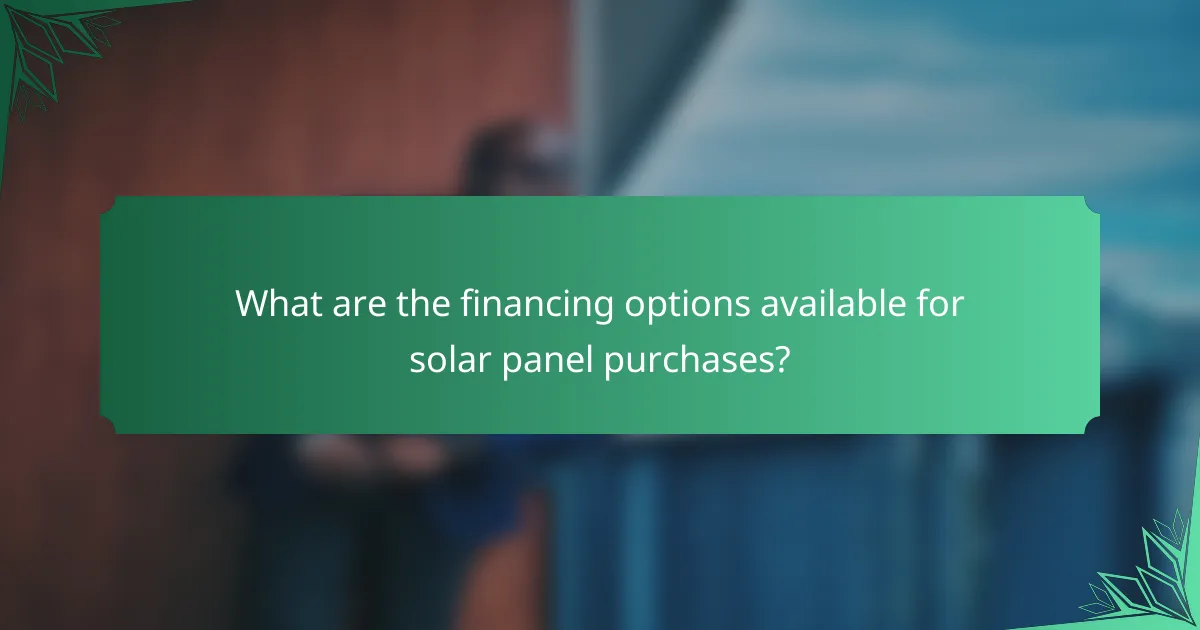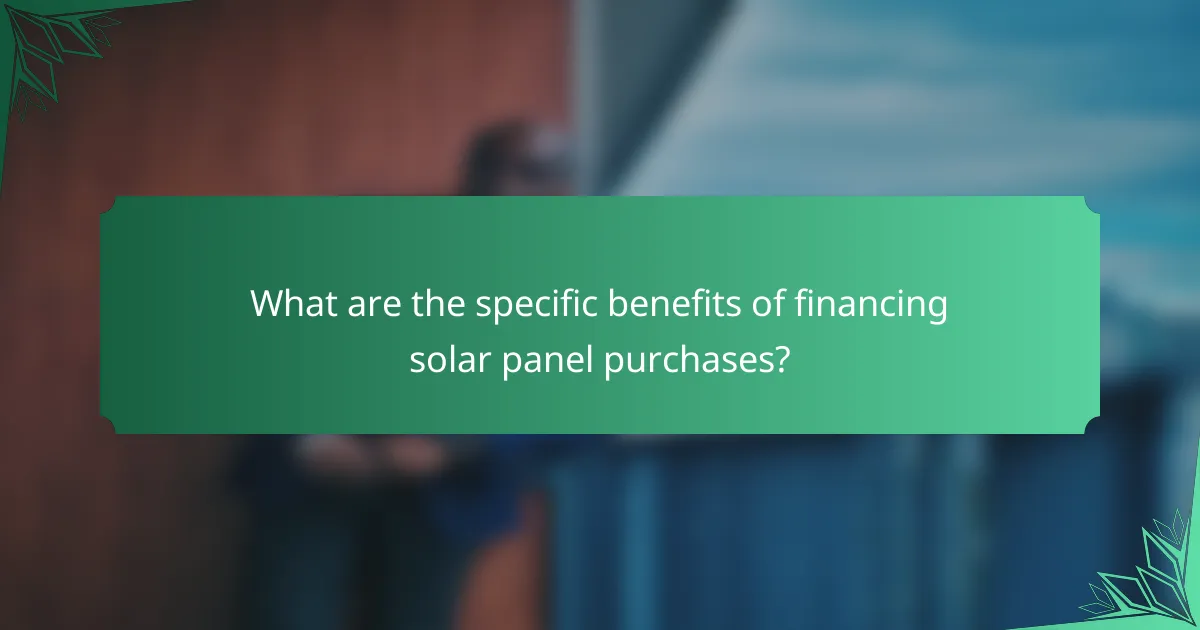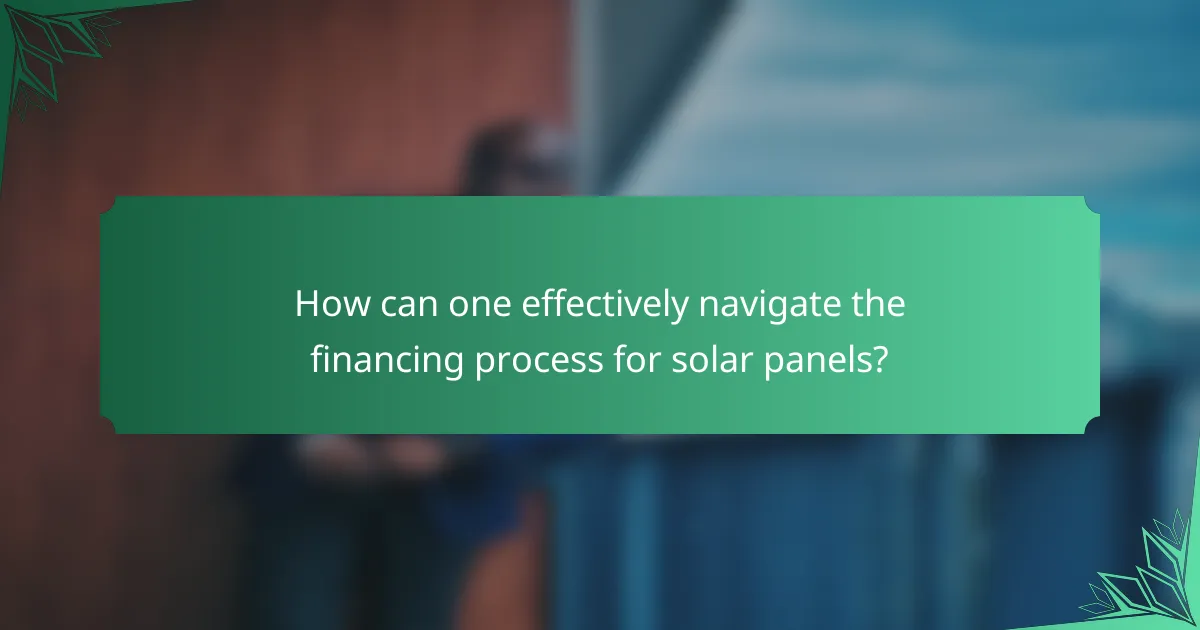
What are the financing options available for solar panel purchases?
The financing options available for solar panel purchases include cash purchases, solar loans, leases, and power purchase agreements (PPAs). Cash purchases allow homeowners to pay for the system outright, maximizing savings over time. Solar loans enable buyers to borrow money to finance the installation, often with low-interest rates. Leases provide a way to rent solar panels, with monthly payments but no ownership of the system. PPAs allow homeowners to pay for the power generated by the solar system at a set rate, typically lower than utility rates. These options cater to different financial situations and preferences, making solar energy accessible to a wider audience.
How do different financing options compare for solar panel purchases?
Different financing options for solar panel purchases include cash purchase, loans, leases, and power purchase agreements (PPAs). A cash purchase provides full ownership and immediate savings on electricity bills. Loans allow for ownership while spreading payments over time, often with low-interest rates. Leases provide access to solar energy without upfront costs but limit ownership benefits. PPAs offer energy at a fixed rate, typically lower than utility rates, but also do not confer ownership. According to the Solar Energy Industries Association, cash purchases yield the highest long-term savings, while leases and PPAs may be more accessible for those without upfront capital.
What are the key features of cash purchases for solar panels?
Cash purchases for solar panels offer several key features. They provide full ownership of the solar system immediately. This eliminates monthly payments associated with financing options. Cash purchases also allow for immediate energy savings. Homeowners can benefit from reduced electricity bills right away. Additionally, cash purchases may qualify for tax incentives. These incentives can further lower the overall cost of the system. The absence of interest rates makes cash purchases financially advantageous. Overall, cash purchases lead to long-term savings and increased property value.
How does financing through loans work for solar panel purchases?
Financing through loans for solar panel purchases allows consumers to borrow money to cover the upfront costs. The loan amount typically includes the price of the solar panels, installation fees, and any additional equipment. Borrowers repay the loan in monthly installments over a specified term, usually ranging from 5 to 20 years. Interest rates can vary based on creditworthiness and the lender’s terms. Many lenders offer secured loans, using the solar system as collateral. Some financing options may also include government incentives or rebates, reducing the overall cost. According to the Solar Energy Industries Association, financing options have made solar energy more accessible, leading to increased adoption rates.
What are the benefits of leasing solar panels instead of purchasing?
Leasing solar panels offers several benefits compared to purchasing them outright. First, leasing typically requires little to no upfront payment. This makes solar energy accessible to more people. Second, lease agreements often include maintenance and repairs at no additional cost. This reduces the financial burden on the lessee. Third, leasing can provide immediate energy savings through lower utility bills. In many cases, the monthly lease payment is less than the savings on energy costs. Fourth, leasing allows for easier upgrades to newer technology as it becomes available. This keeps the system efficient and up-to-date. Lastly, leasing can offer tax benefits for the leasing company, which may translate into lower costs for the lessee. Overall, these factors make leasing an attractive option for many homeowners considering solar energy.
What factors should be considered when choosing a financing option?
When choosing a financing option for solar panel purchases, consider interest rates. Lower interest rates reduce overall costs. Evaluate loan terms, as shorter terms often mean higher monthly payments but less interest paid over time. Assess your credit score, since it influences the financing options available to you. Look at fees associated with the financing, including origination fees or prepayment penalties. Consider the total cost of ownership, which includes installation, maintenance, and potential savings on energy bills. Analyze available incentives, such as tax credits or rebates, that can affect the overall financial impact. Lastly, review the lender’s reputation and customer service to ensure a smooth financing experience.
How does credit score impact financing options for solar panels?
A credit score significantly impacts financing options for solar panels. Lenders use credit scores to assess the risk of lending money. Higher credit scores generally lead to better financing terms. These terms may include lower interest rates and higher loan amounts. Conversely, lower credit scores can result in higher interest rates and limited financing options. Some lenders may even deny loans based on poor credit scores. According to a report by the Consumer Financial Protection Bureau, individuals with higher credit scores are often eligible for more favorable loan conditions. This demonstrates the crucial role of credit scores in determining financing accessibility for solar panel purchases.
What role does the total cost of solar panel systems play in financing decisions?
The total cost of solar panel systems significantly influences financing decisions. It determines the upfront investment required for installation. Higher total costs may lead to the need for loans or financing options. Conversely, lower costs may allow for cash purchases. Financial institutions often assess total costs to evaluate loan amounts. This assessment impacts interest rates and repayment terms offered to consumers. Additionally, total costs affect return on investment calculations. A lower total cost can result in quicker payback periods. Thus, the total cost is a crucial factor in financing solar panel systems.

What are the specific benefits of financing solar panel purchases?
Financing solar panel purchases provides several specific benefits. Firstly, it allows homeowners to install solar systems without the need for large upfront costs. This makes solar energy accessible to more people. Secondly, financing options often come with low-interest rates. This can lead to significant savings over time compared to paying cash. Thirdly, many financing plans include flexible payment terms. Homeowners can choose a plan that fits their budget.
Additionally, financing can help homeowners take advantage of tax incentives. For example, the federal solar tax credit can reduce overall costs. Furthermore, financing can lead to immediate energy savings. Homeowners often see a reduction in their electricity bills shortly after installation. Lastly, financing options can improve cash flow. This allows homeowners to invest in other home improvements or savings while still going solar.
How can financing options make solar energy more accessible?
Financing options can make solar energy more accessible by reducing the upfront costs associated with solar panel installation. Many homeowners find the initial investment prohibitive. Financing solutions like loans, leases, and power purchase agreements (PPAs) allow consumers to spread costs over time. This enables more individuals to invest in solar energy without significant financial strain.
According to the Solar Energy Industries Association, residential solar installations increased by 20% in 2020, partly due to financing options. Additionally, programs like the Federal Solar Tax Credit further incentivize adoption by allowing for deductions on federal taxes. These financial mechanisms empower a broader demographic to transition to renewable energy sources.
What financial incentives are available for solar panel financing?
Financial incentives for solar panel financing include federal tax credits, state rebates, and solar renewable energy certificates (SRECs). The federal solar tax credit allows homeowners to deduct 26% of the cost of solar systems from their federal taxes. Many states offer rebates that reduce the upfront cost of solar installations, which can vary significantly. SRECs provide additional income by allowing solar system owners to sell certificates for the renewable energy they generate. These incentives can significantly lower the overall cost of solar panel financing and encourage adoption.
How do financing options affect the return on investment for solar panels?
Financing options significantly impact the return on investment (ROI) for solar panels. Different financing methods can alter the upfront costs and overall savings. For example, cash purchases provide immediate ownership and maximize savings from energy bills. In contrast, loans may involve interest payments, reducing net savings.
Leases often require lower initial payments but limit the tax benefits. Power Purchase Agreements (PPAs) allow users to pay for energy produced, which can lead to lower monthly costs. According to the Solar Energy Industries Association, homeowners can save an average of $20,000 over 20 years with optimal financing.
Ultimately, the choice of financing affects cash flow, tax incentives, and long-term savings, influencing the overall ROI.
What are the risks associated with financing solar panel purchases?
The risks associated with financing solar panel purchases include financial liability, fluctuating energy savings, and potential equipment failure. Financing options may involve loans or leases that require monthly payments. If energy savings do not meet expectations, homeowners may struggle to cover these payments. Additionally, solar panels can have maintenance costs that add to financial burdens. There is also the risk of changes in government incentives or tax credits, which could impact overall costs. Equipment failure can lead to unexpected repair expenses, further complicating financial planning. According to the Solar Energy Industries Association, the average lifespan of solar panels is around 25 years, but early failures can occur.
How can high-interest rates impact the overall cost of solar panel financing?
High-interest rates can significantly increase the overall cost of solar panel financing. When interest rates rise, the monthly payments on loans for solar panels become higher. This occurs because borrowers pay more in interest over the life of the loan. For example, a loan of $20,000 at a 5% interest rate may cost around $377 monthly. If the interest rate increases to 7%, the monthly payment could rise to approximately $400. Over a 20-year loan term, this difference can add thousands of dollars to the total repayment amount. Higher interest rates also reduce the affordability of solar installations for consumers. This can lead to fewer people opting for solar energy solutions, ultimately affecting market growth.
What should buyers know about the terms and conditions of financing agreements?
Buyers should understand that financing agreements for solar panel purchases contain specific terms and conditions. These terms outline the interest rates, repayment periods, and any fees associated with the loan. Buyers must also be aware of the total cost of the financing, including principal and interest. Understanding the consequences of missed payments is crucial, as it may lead to penalties or loss of the solar system. Additionally, buyers should check for any prepayment penalties that could apply if they pay off the loan early. Clarity on the warranty and maintenance obligations is also essential. Buyers should read the fine print to ensure they are fully informed.

How can one effectively navigate the financing process for solar panels?
To effectively navigate the financing process for solar panels, start by researching available financing options. These options include loans, leases, and power purchase agreements (PPAs). Each option has distinct terms and conditions that affect overall costs. Compare interest rates and repayment periods to find the best fit for your budget.
Check for federal, state, and local incentives that can reduce upfront costs. The federal solar tax credit allows homeowners to deduct a percentage of the installation costs from their taxes. Additionally, some states offer rebates or grants for solar installations.
Consult with solar providers to understand their financing packages. Many companies offer in-house financing with competitive rates. Read reviews and ask for references to ensure reliability.
Finally, evaluate your credit score, as it influences loan approval and interest rates. A higher credit score typically results in better financing terms. By following these steps, you can make informed decisions and secure favorable financing for your solar panel purchase.
What steps should be taken to secure financing for solar panels?
To secure financing for solar panels, begin by assessing your budget and financing needs. Identify the total cost of the solar panel system, including installation. Research available financing options such as loans, leases, and power purchase agreements (PPAs). Compare interest rates, terms, and conditions from multiple lenders. Gather necessary documentation, including credit history and income verification. Apply for financing with the selected lender, providing all required information. Review the financing agreement carefully before signing. Ensure that the financing option aligns with your long-term financial goals.
How can consumers compare different financing offers for solar panels?
Consumers can compare different financing offers for solar panels by evaluating key factors. These factors include interest rates, loan terms, and total repayment amounts. Consumers should analyze the annual percentage rate (APR) to understand the overall cost of financing. Comparing monthly payment amounts is also essential for budgeting. Additionally, consumers should consider any upfront costs or fees associated with each offer. Reviewing the flexibility of repayment terms can impact overall satisfaction. Lastly, checking for any incentives or rebates offered can enhance the value of financing options. By systematically assessing these attributes, consumers can make informed decisions regarding solar panel financing.
What documentation is typically required for solar panel financing?
Documentation typically required for solar panel financing includes proof of income, credit history, and property ownership. Lenders often request recent pay stubs or tax returns as proof of income. A credit report helps assess the borrower’s creditworthiness. Documentation of property ownership may include a mortgage statement or property deed. Additionally, some lenders may require a detailed solar project proposal. This proposal outlines system specifications and estimated costs. Collectively, these documents support the financing application process for solar panel installations.
What tips can help maximize the benefits of financing solar panel purchases?
To maximize the benefits of financing solar panel purchases, consider several key strategies. First, choose a financing option with low-interest rates. Lower rates can reduce overall repayment amounts. Next, evaluate available tax incentives. Federal and state tax credits can significantly offset costs. Third, select a loan term that aligns with your financial situation. Shorter terms may have higher monthly payments but lower interest costs. Additionally, ensure that the solar system is installed by a reputable company. Quality installation can enhance system efficiency and longevity. Lastly, monitor energy savings post-installation. Tracking savings can validate the financial benefits of your investment.
How can consumers improve their chances of getting favorable financing terms?
Consumers can improve their chances of getting favorable financing terms by maintaining a strong credit score. A credit score above 700 is generally considered good and can lead to lower interest rates. Paying bills on time and reducing debt-to-income ratios are effective strategies. Lenders often prefer borrowers with stable employment and income. Shopping around for multiple financing options can also yield better terms. Comparing offers from different lenders helps identify the best rates and conditions. Additionally, providing a larger down payment can lower financing costs. Overall, these strategies enhance the likelihood of securing favorable financing terms.
What common mistakes should be avoided when financing solar panels?
Common mistakes to avoid when financing solar panels include not researching financing options thoroughly. Many consumers overlook available incentives and rebates. Failing to compare interest rates can lead to higher costs. Not understanding the terms of the loan may result in unexpected fees. Ignoring the total cost of ownership is another common error. It is crucial to consider maintenance and insurance costs. Additionally, not checking the credit score can affect financing terms. Finally, rushing the decision without consulting experts can lead to poor choices.
The main entity of this article is financing options for solar panel purchases. It provides a detailed overview of various financing methods, including cash purchases, solar loans, leases, and power purchase agreements (PPAs), highlighting their respective benefits and drawbacks. Key factors influencing financing decisions, such as interest rates, credit scores, and total costs, are also examined. Additionally, the article discusses financial incentives available for solar panel financing and offers practical tips for consumers to navigate the financing process effectively. Overall, it aims to inform readers about accessible financing solutions that can facilitate the adoption of solar energy.